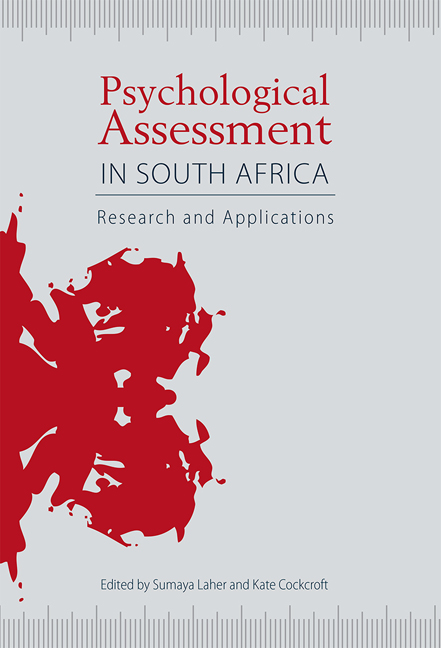Book contents
- Frontmatter
- Contents
- Tables and figures
- Acknowledgements
- Acronyms and abbreviations
- 1 Contextualising psychological assessment in South Africa
- Section One Cognitive tests: conceptual and practical applications
- Section Two Personality and projective tests: conceptual and practical applications
- Section Three Assessment approaches and methodologies
- 28 Ethical perspectives in assessment
- 29 Using computerised and internet-based testing in South Africa
- 30 The ImPACT neurocognitive screening test: a survey of South African research including current and projected applications
- 31 A family consultation model of child assessment
- 32 Qualitative career assessment in South Africa
- 33 Psychological assessment and workplace transformation in South Africa: a review of the research literature
- 34 Assessment of prior learning: a South African perspective
- 35 Large-scale assessment studies in South Africa: trends in reporting results to schools
- 36 Current and future trends in psychological assessment in South Africa: challenges and opportunities
- Contributors
- Index
29 - Using computerised and internet-based testing in South Africa
from Section Three - Assessment approaches and methodologies
Published online by Cambridge University Press: 21 April 2018
- Frontmatter
- Contents
- Tables and figures
- Acknowledgements
- Acronyms and abbreviations
- 1 Contextualising psychological assessment in South Africa
- Section One Cognitive tests: conceptual and practical applications
- Section Two Personality and projective tests: conceptual and practical applications
- Section Three Assessment approaches and methodologies
- 28 Ethical perspectives in assessment
- 29 Using computerised and internet-based testing in South Africa
- 30 The ImPACT neurocognitive screening test: a survey of South African research including current and projected applications
- 31 A family consultation model of child assessment
- 32 Qualitative career assessment in South Africa
- 33 Psychological assessment and workplace transformation in South Africa: a review of the research literature
- 34 Assessment of prior learning: a South African perspective
- 35 Large-scale assessment studies in South Africa: trends in reporting results to schools
- 36 Current and future trends in psychological assessment in South Africa: challenges and opportunities
- Contributors
- Index
Summary
Test users need to be aware of the complexities involved in the use of computerised tests in South Africa. Firstly, it is important to understand that not all computerised tests are the same, and that they differ greatly in their sophistication. This has implications for the professional decisions we make regarding the use of particular tests. This chapter begins with a discussion of the different ways in which computerised testing can be understood. We shall also review the historical background of computerised testing in this country with regard to both the technical aspects and the regulatory framework of psychological tests, in order to help users make informed decisions regarding the use of computerised tests.
What does ‘computerised testing’ mean?
Not all ‘computerised’ tests rely on computer technology to the same degree, or were designed and programmed for implementation on computers with the same level of skill and sophistication. Several aspects of testing can be computerised, such as the administration of the test, scoring and norming, and the generation of narrative reports or data summaries. Sometimes, for a particular test, not all these aspects are implemented to the same degree of sophistication, or at all. Test administration systems also vary in how they employ computer technology. If a test is delivered ‘online’, for instance, it means that the program that controls the test administration is located on a server somewhere on the internet, and not on the computer used for administration. Online, or internet-based, administration creates the possibility of administering a test in an unsupervised way, at the respondent's convenience. However, it is quite possible to administer an online test with some degree of control, provided that the necessary technology is in place and is properly utilised.
Scoring and norming
The simplest form of computerisation in psychometrics is the use of computer software to score multiple-choice tests that have been administered using pencil and paper. Data input can be manual, using a spreadsheet or similar software, or even software especially written for the test in question. It can also be mechanised, or purely electronic. Early forms of mechanised data acquisition involved special cards, with the respondent punching a hole in the card to indicate his or her answer. Optical mark readers have been the predominant technology for mechanical input of test responses for the past few decades.
- Type
- Chapter
- Information
- Psychological Assessment in South AfricaResearch and Applications, pp. 424 - 442Publisher: Wits University PressPrint publication year: 2013

